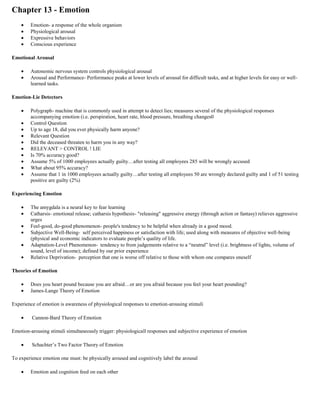
Chapter 13 emotion
- 1. Chapter 13 - Emotion<br />Emotion- a response of the whole organism<br />Physiological arousal<br />Expressive behaviors<br />Conscious experience<br />Emotional Arousal<br />Autonomic nervous system controls physiological arousal<br />Arousal and Performance- Performance peaks at lower levels of arousal for difficult tasks, and at higher levels for easy or well-learned tasks.<br />Emotion-Lie Detectors<br />Polygraph- machine that is commonly used in attempt to detect lies; measures several of the physiological responses accompanying emotion (i.e. perspiration, heart rate, blood pressure, breathing changes0<br />Control Question<br />Up to age 18, did you ever physically harm anyone?<br />Relevant Question<br />Did the deceased threaten to harm you in any way?<br />RELEVANT > CONTROL ! LIE<br />Is 70% accuracy good?<br />Assume 5% of 1000 employees actually guilty…after testing all employees 285 will be wrongly accused<br />What about 95% accuracy?<br />Assume that 1 in 1000 employees actually guilty…after testing all employees 50 are wrongly declared guilty and 1 of 51 testing positive are guilty (2%)<br />Experiencing Emotion<br />The amygdala is a neural key to fear learning<br />Catharsis- emotional release; catharsis hypothesis- quot; releasingquot; aggressive energy (through action or fantasy) relieves aggressive urges<br />Feel-good, do-good phenomenon- people's tendency to be helpful when already in a good mood.<br />Subjective Well-Being- self perceived happiness or satisfaction with life; used along with measures of objective well-being (physical and economic indicators to evaluate people’s quality of life.<br />Adaptation-Level Phenomenon- tendency to from judgements relative to a “neutral” level (i.e. brightness of lights, volume of sound, level of income); defined by our prior experience<br />Relative Deprivation- perception that one is worse off relative to those with whom one compares oneself<br />Theories of Emotion<br />Does you heart pound because you are afraid…or are you afraid because you feel your heart pounding?<br />James-Lange Theory of Emotion<br />Experience of emotion is awareness of physiological responses to emotion-arousing stimuli<br /> Cannon-Bard Theory of Emotion<br />Emotion-arousing stimuli simultaneously trigger: physiologicall responses and subjective experience of emotion<br /> Schachter’s Two Factor Theory of Emotion<br />To experience emotion one must: be physically aroused and cognitively label the arousal <br />Emotion and cognition feed on each other<br />